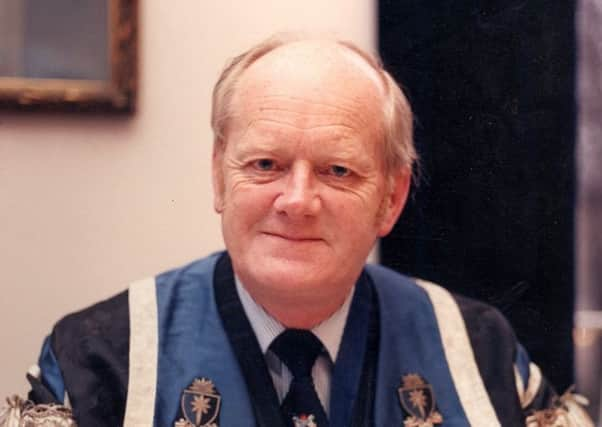Obituary: Sir Malcolm Macnaughton, obstetrician and gynaecologist


A man of great humanity, the eminent Scottish professor Malcolm Macnaughton endured being vilified in Parliament for work that was close to his heart: his part in producing the 1984 Warnock Report on human fertilisation and embryology.
To Macnaughton’s dismay, public debate after the report’s publication centred on the issue of embryo experimentation: something that he, and the report, both recommended should be allowed, but which many people at the time thought should be banned.
Advertisement
Hide AdAdvertisement
Hide AdThe debate now seems quaint, but Macnaughton was named in the House of Commons, and a Private Member’s Bill, introduced by Conservative MP Enoch Powell, who sought a ban, came close to becoming law.
“We will all have wasted our time,” Macnaughton lamented, as the furore continued – but in the end it was he and his dozen colleagues on the Warnock committee who would win the day. Their recommendations became the basis for British legislation on in-vitro fertilisation and related issues, such as embryo research.
They had spent two years, under the chairmanship of the philosopher (and future Dame and Baroness) Mary Warnock, inquiring into the implications of the then-revolutionary IVF technique that had enabled the birth, in 1978 at Oldham, near Manchester, of the world’s first “test-tube” baby, Louise Brown. The technique had also made embryo research possible.
Macnaughton before almost anyone else saw the potential of such work: it could lead, he was sure, not only to overcoming infertility, but also to the prevention or cure of many distressing conditions.
Always known to friends and colleagues as Callum, Malcolm Campbell Macnaughton sprang from a family of Glasgow “south-siders” long called either to working in the farthest reaches of the British Empire, or taking up vocations in the Kirk.
His father, James, had prospered as secretary of the Straits Trading Company at Singapore; he and his younger brother, Douglas, were brought up in Pollokshields, and later Kilmacolm. Douglas became a Church of Scotland minister. Macnaughton attended Glasgow Academy and then Glasgow University, where he graduated in 1948. He did his National Service with the Royal Army Medical Corps, serving in Hong Kong from 1949-50, and rising to the rank of captain.
“He carried his faith lightly,” it was once said of him, but Macnaughton brought a strong moral sense to the practice of medicine. The grim conditions for women and families that he found as a young doctor in the east end of Glasgow set the course of his career as one dedicated to alleviating human misery.
A stint at Bellshill Maternity Hospital in Lanarkshire stimulated his research interests, and he derived further food for thought from the work on women’s health of Sir Dugald Baird, Regius Professor of Midwifery, under whom, at the University of Aberdeen, he took up a lectureship in 1957. Macnaughton returned to Glasgow to take up the post Muirhead Professor of Obstetrics and Gynaecology at Glasgow University in 1970 after posts as a lecturer at the universities of St Andrews and Dundee. He continued to perform surgery, and to hold clinics at the city’s hospitals.
Advertisement
Hide AdAdvertisement
Hide AdHe had married, in 1955, Margaret-Ann Galt, a family planning nurse – who in a later age would herself have become a doctor – and who supported him in his steady desire to change social attitudes. The couple met at Glasgow’s Victoria Infirmary. They would have two sons and three daughters: Graham, Torquil, Jane, Gillian and Jennifer.
Macnaughton and his younger brother Douglas remained close, often conferring together, and their two families for many years spent joint caravan holidays at places such as Lochearnhead and Aviemore. Macnaughton was a keen angler, enjoyed the sport of curling, and had a sailing dinghy.
As a surgeon, he took on challenges, sometimes returning home exhausted. Colleagues remember an emerging talent for bringing the right teams together; and a charm that made even those who did not share his outlook warm to him.
He published many scholarly articles, and a research survey he established in 1976 is considered to have helped reduce Scotland’s perinatal mortality rate. His work took him to the United States, India, and Jamaica. At home, as well as being Warnock’s only committee member with professional involvement in techniques of assisted conception, he rose to be, from 1984-87, president of the Royal College of Obstetricians and Gynaecologists.
The year 1986 brought for Macnaughton a knighthood – but amid the acclaim, in the same year, came his life’s great sorrow: the deaths of his brother Douglas and sister-in-law, Douglas’s wife Sheila, in a car crash.
Much shaken, Macnaughton determined to continue working, and retired from the professorship only in 1990. He went on to be president of the British Fertility Society from 1992-1995, and was for ten years national chairman of Tenovus Scotland, the medical research charity.
His wife and children survive him.
Ever an optimist, he wrote, at the height of the mid-1980s fuss: “I hope the results of embryo work will be of great value 30 years from now.” With today’s advances in the science of stem cells, history has endorsed his foresight.